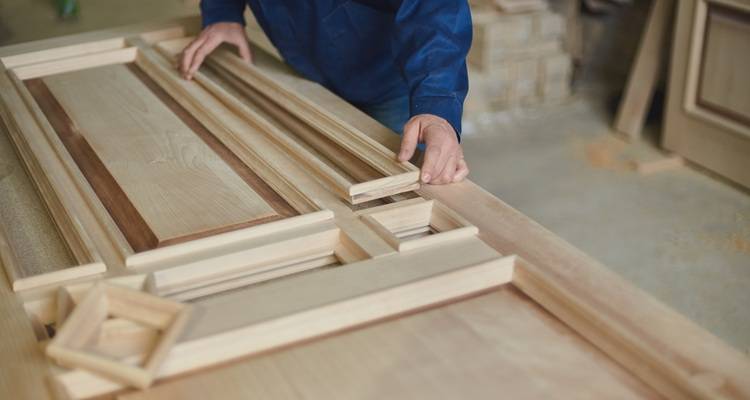How Much Do Carpenters Make?
The UK is currently facing a shortage of construction workers, including carpenters, which means that in most areas, there are opportunities to find work.
Exactly how much do carpenters make, and what factors influence their earnings?
The average salary for a qualified carpenter in the UK is between £18 and £25 per hour. Read our guide to find out more about the trade and what a carpenter's salary looks like from starting out as an apprentice to working for yourself or as an employee once you’re fully qualified.
Let’s get started.

Table of Contents
Average Carpenter Salary
Do you want to know how much a carpenter earns?
If you enjoy working with your hands and don’t want to work in an office, then you might want to consider training to become a carpenter. Carpentry is a well-paid, skilled trade with a competitive carpenter salary that attracts many professionals.
The average carpenter salary in the UK ranges between £17,000 and £38,000 per year for a standard 40-45 hour workweek.
Carpenters build, install and repair wooden fixtures and fittings for residential and commercial settings. Jobs include installing frameworks for buildings and bridges, making roof rafters or creating bespoke interiors such as cupboards and kitchens.
Here’s a short overview of the average salary for a carpenter in the UK:
How Much Does a Carpenter Make?
| Position | Hourly Rate | Daily Rate | Average Yearly Income | Average Monthly Take Home Pay After Tax and NI | Average Weekly Take Home Pay After Tax and NI |
|---|---|---|---|---|---|
| Apprentice Carpenter | £6.40 | £51.20 | £13,312 | £1,092.01 | £252.01 |
| Newly Qualified | £8.41 | £67.31 | £17,500 | £1,342.86 | £309.90 |
| Employed | £23.00 | £184.00 | £47,840 | £3,163,71 | £730.09 |
| Self-Employed | £36.00 | £288.00 | £74,880.00 | £4,498.99 | £1,038.22 |
| Running Own Company | £50.00 | £400.00 | £104,000.00 | £5,604.86 | £1,293.42 |
As you can see, you can raise your rates substantially once you are qualified. You can earn more working for yourself if you don’t mind the extra responsibilities that come with running your business.

You will also need to consider the extra costs of being self-employed or having your own company. Expenses like fuel, vehicle costs and materials will impact the amount you take home at the end of the month.
Factors Affecting Carpenter Salaries
Your average carpenter’s salary will also be affected by a number of factors, including location, qualifications, the type of employment you choose and whether or not you specialise.

Location
If you live in London or the southeast of England, you will likely earn more than in other parts of the UK. This is because the cost of living is higher and is reflected in the price of products and services. You’ll also find that carpenter’s rates in Edinburgh are higher than in Glasgow or Aberdeen.
Have a look at the difference in income for carpenters in London, Brighton, Liverpool, Newcastle and Edinburgh.
| Location | Average Rate Per Hour | Average Day Rate |
|---|---|---|
| London | Between £35 and £38 | Between £280 and £304 |
| Brighton | Between £23 and £29 | Between £184 and £232 |
| Liverpool | Between £17 and £25 | Between £136 and £200 |
| Newcastle | Between £16 and £24 | Between £128 and £192 |
| Edinburgh | Between £25 and £30 | Between £200 and £240 |
Qualifications
Experience and qualifications also affect the amount a carpenter can earn. For example, an apprentice carpenter will earn less than a newly qualified or experienced carpenter.
| Experience | Average Annual Salary |
|---|---|
| Apprentice | Between £15,000 and £17,000 |
| Newly qualified | Between £19,000 and £22,000 |
| Experienced | Between £35,000 and £45,000 |
The qualifications you can take to become a carpenter include:
Apprenticeship
An apprenticeship allows you to combine your studies with hands-on experience. You can become an apprentice straight from school at the age of 16. You may need GCSEs in English and Maths, but the opportunity to study for these qualifications may be included in your apprenticeship.
A great way to find out about carpentry apprenticeship training is to browse the Find Apprenticeship Training page from the Gov.UK website.
Add your postcode to the search box, and you will get a full list of colleges with reviews from employers and apprentices, plus the details of how the course is offered and an achievement rate. The achievement rate is shown as a percentage of the apprentices who successfully achieved their apprenticeship.
College Course
College courses can be full-time or part-time. Some courses are fully funded, and others may require some type of financial contribution. You may also need to attend an interview, and you may need to have or study for GCSE in English and Maths. Typical college courses include:
Level 1 Diploma in Carpentry – Duration 1-year Full-Time Study – Suitable for Adults from the age of 16.
This course will teach you how to use and maintain carpentry tools, produce woodworking joints and learn about the principles of building construction. You will also have classes about health and safety.
Some colleges or universities offering a level one course want applicants with three or more GCSEs, including Maths and English. But some courses will accept applicants after an interview, so it’s worth applying even if you don’t have the relevant qualifications. You might be asked to study for GCSEs at evening classes or online.
Level 2 Diploma in Site Carpentry – Duration 1-year Full-Time Study – Suitable for Adults from the age of 16
During the level 2 course, you will learn how to produce stairwells, windows and doors using industry-standard machine tools. By the end of the course, you will be able to complete various jobs, including:
- Hanging doors
- Fixing skirtings
- Laying floorboards
- Forming timber joints
- Erecting roof trusses
Some colleges also offer the opportunity to study for English and Maths qualifications, a work placement and help and advice with your C.V.
Level 2 Diploma in Bench Joinery – Duration 1-year Full Time or Part Time – Suitable for Adults from the age of 16
During this course, you will learn how to set up and use a circular saw, manufacture bench joinery products and learn about health and safety in construction. Most courses also include the opportunity for a work placement. Grade 4/C English and Maths are required, but you can study for these qualifications while you attend the level 2 joinery course by studying in the evenings or online.
Level 3 Diploma in Carpentry – Suitable for Qualified Adults – 1-Year Full or Part Time or Privately over 10 weeks Full-Time or 25 Weeks at Weekends
To take this course, you need to have a level 2 qualification or 5+ years of carpentry experience. You will learn advanced skills in site carpentry, including:
- First Fix flooring and roofing
- Installation of kitchen units and worktops
- Understanding energy efficiency, quantity estimation and effective communication
- First and Second Fixing doors and stairs
- Moulding installation
- Use of machinery
Private carpentry courses cost £4,000. Public colleges cost around £3,400, but there may be financial support depending on your personal circumstances.
NVQ
An NVQ or City and Guilds diploma course includes (subject to a test) a CSCS card, which allows you to work in the industry. You can complete your studies on a full-time or part-time basis.
There are private colleges which offer fast-track full-time study or weekend courses, but these tend to cost around £4,000.
Most private courses ask for a deposit and then accept monthly payments. For example, a course that costs £3,995 may be paid with 6 monthly instalments of £582.50 and a deposit of £500. Courses like these generally offer full-time study for 10 weeks or part-time study over 25 weekends.
If you are undergoing an apprenticeship, it is likely you will be studying for an NVQ qualification. Most apprenticeships result in a level two qualification, which takes around two years. Level 3 is for experienced carpenters who want a qualification in advanced carpentry.
A full-time NVQ course in carpentry at a college is usually free for people between 16 and 18 years old. Adult learners may also be able to do a course without paying or with a 50% discount.
The criteria are based on your household income, where you live and your age. A typical year-long college course will cost on average around £2,900 before discounts are applied. You can find college courses near you by browsing the internet for the college course you want to do.
T-Levels
T-Levels are designed for 16- to 19-year-olds who receive classroom learning with on-the-job experience. The T-Level qualification in Onsite Construction Carpentry and Joinery is a 2-year full-time course. You will also have the opportunity to study for English and Maths qualifications and complete an industry placement. But you will also need two more GCSEs, making four in total.
If you haven’t got 4 GCSEs, but you do have English and Maths, then you may want to study for a Site Carpentry 2 T Level Foundation. This is a one-year course studying full-time and leads to a level 2 Site Carpentry Technical Certificate.
Tuition fees are free, but you will need around £400 for course materials, personal protective equipment and a toolkit to use during classes.
On the Job Training
On-the-job training usually means you will learn while working for an experienced carpenter and study during the evenings or weekends for a recognised qualification. Many colleges offer part-time diploma courses for two evenings a week over a 9-month period.
Type of Work: Employed or Self-Employed
Employed carpenters tend to earn more than carpenters who are self-employed. This is because if you are self-employed, you can set your own hourly rate. You can also work longer hours if you choose. There’s also the opportunity to sell items you have made as a second revenue stream.

An employed carpenter will usually work fixed hours for a company and receive a set wage at the end of the month. The upside of employment is that you don’t have the responsibility of running your own business, and you know how much money is coming in at the end of the month. Job board websites advertise jobs for carpenters all over the U. You can also find job advertisements on the Find a Job government website.
Specialisation
If you want to specialise rather than carry out general carpentry, this may mean you can charge a higher rate. For example, heritage restoration is a skilled job that includes repairing and restoring buildings using a mix of traditional and modern methods to bring a historic building or monument back to its former glory.
Other specialisms include the creation of bespoke kitchen cabinets, shopfitting and working on boats and ships.
How Carpenters Charge for Work
Carpenters can choose the way they price a job. There are various ways of charging for carpentry work, and they include:
Hourly Rate – A carpenter will usually charge an hourly rate for small jobs that will only take a few hours. For example, repairing a door frame or fixing a kitchen cabinet. Average hourly rates for a carpenter are between £16 and £30, but you will pay more in London and the southeast of England.
Day Rate – Larger jobs that will take a day or two will be charged at a day rate. The average day rate for a carpenter outside London is between £184 and £240.

Per Project – If a carpenter supplies and fits skirting boards for a room. It is likely they will charge per room rather than by the hour or day. An average-sized room could cost between £225 and £300.
Per Item – A per-item charge is normally made when a carpenter creates a bespoke piece of furniture, such as a chair. A large piece of bespoke furniture could cost between £600 and £1000. A wooden chair might cost between £250 and £400.
Per Square Metre – Often, carpenters install wooden flooring. In this case, they might choose to charge per square metre. For example, the installation of a natural wood floor might cost between £30 and £40 per square metre.
Typical rates for common carpentry jobs can be seen in the chart below:
| Carpentry Job | Average Cost |
|---|---|
| General Carpentry | £20 to £30 an hour |
| Repairing small pieces of wooden furniture | £20 to £25 per hour |
| Creating a built-in wardrobe | £750 to £1250 |
| Making and fitting skirting boards | £225 to £300 per room |
| Hanging new doors | £320 to £800 per set |
| Installing wooden flooring | £20 to £80 per square metre |
| Creating and fitting wooden shelving | £200 to £300 |
| Creating bespoke furniture | £300 to £1000 plus |
Ways to Increase Earnings as a Carpenter
There are various ways you can increase your earnings as a carpenter. The obvious way may be to work some evenings and weekends. But that’s not ideal, and to have a good work-life balance, you would be better off doing one or more of the following:
Upskilling
By learning new techniques, you can expand your services and therefore increase your profit margins. For example, if you hold an NVQ level 2 qualification, you could study for level 3.
Level 3 carpentry includes the use of shaping and cutting machines for the creation of bespoke doors and frames, staircases, mouldings, roof structures and more. It will provide the qualifications you’ll need in wheelwrighting, shopfitting, architectural joinery, and timber frame erection.

You can also take short courses to specialise in heritage carpentry, kitchen fitting, or joinery. Many short courses are available as evening or weekend activities so that you don’t need to give up work.
Expanding Your Carpentry Services
You can expand your services to include bespoke carpentry and premium furnishings using high-end materials. You can charge more for unique pieces tailored to the customer’s requirements.
Building a Reputation for High-Standard Work and Reliability
You can charge more if you have a good reputation for the standard of your work and reliability. Many trades, including carpentry, get work through word of mouth. Recommendations from satisfied customers will ensure you always have work.
Getting back quickly to potential customers who have queries or want a quote, turning up on time, tidying up after a job and meeting deadlines will ensure you build a solid reputation in the carpentry business.
Setting Up Your Own Business
Setting up your own business and employing additional workers to allow you to take on more work. If you are already registered as a sole trader, you can hire employees without registering as a limited company. All you need to do is register as an employer with HMRC and submit PAYE registration forms
If your earnings start to increase significantly, then you may want to change from a sole trader to a limited company for the potential tax savings. You will need to notify HMRC, register your company at Companies House, and pay corporation tax.
How a Carpenter’s Salary Compares With Other Trades
If you’re curious as to how carpentry compares with the hourly rate of other trades, have a look at the chart below. These are average earnings. Rates are impacted by your location.

You are likely to earn more if you live in London or the South East of England.
| Trade | Average Annual Income | Average Hourly Rate |
|---|---|---|
| Carpenter | £16 to £50 | |
| Plumber | £27 to £80 | |
| Electrician | £28 to £50 | |
| Bricklayer | £12 to £20 | |
| Scaffolder | £18 to £35 | |
| Labourer | £10 to £40 | |
| Kitchen Fitter | £18 to £37 |
Summary
As you can see, carpentry is a well-paid, skilled occupation with plenty of job opportunities. It is a reliable industry to enter for school leavers, college graduates and adults who want to make a career change.
- Newly qualified carpenters can earn up to £22,000 a year.
- Earnings are impacted by your location, your specialisms and whether you are an employee or self-employed.
- The internet can help you find work, training, or job leads.
- There is a skill shortage of trades in the UK, so qualified carpenters are in demand in the construction industry
If you don’t want to sit behind all day and enjoy physical work, a varied daily routine, and meeting new people, then a career in carpentry may be a good choice for you.
FAQs
What is the average carpenter salary in the UK?
An experienced carpenter can earn between £23 and £30 an hour. This equates to an annual wage of between £47,840 and £62,400. After tax and national insurance, your approximate weekly wage will be between £730.09 and £899.02.
If you own your own business, then you should earn more. It is likely that your earnings could be between £40 and £50 per hour, although you will have extra expenses due to business costs. Your yearly earnings should be around £83,200 and £104,000 before expenses, taxes and national insurance are deducted.
Do self-employed carpenters earn more?
How long does it take to become a qualified carpenter?
Does the UK have a high demand for carpenters?
What’s the best way to attract customers if I work for myself?
Another way to attract customers is to have a website. A professional design that showcases your previous work and explains your services will help you to attract potential customers who browse the internet for carpenters near to home.
Sources
https://www.theworkersunion.com/2025/02/03/uk-construction-industry-faces-critical-worker-shortage-as-population-growth-surges/
https://uk.indeed.com/career/carpenter/salaries
https://www.thecollege.co.uk/courses/diploma-in-carpentry-and-joinery-level-1-part-
time-evening
https://www.cityofbristol.ac.uk/courses/bench-joinery-for-adults/
https://www.gov.uk/set-up-limited-company








